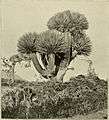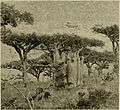Henry Ogg Forbes
Henry Ogg Forbes (30 January 1851 – 27 October 1932) was a Scottish explorer, ornithologist, and botanist. He also described a new species of spider, Thomisus decipiens.[1]
Forbes was the son of Rev. Alexander Forbes, M.A., and his wife Mary née Ogg,[2] and was born at Drumblade, Huntly, Aberdeenshire.[2] He was educated at Aberdeen Grammar School, the University of Aberdeen and the University of Edinburgh,[3]
Forbes was active primarily in the Moluccas, Sumatra and New Guinea. He served as director of the Canterbury Museum in New Zealand between 1890 and 1893, and eventually moved to Liverpool, England, where he served as a consulting director of museums there until his death.[4]
Henry Ogg Forbes dedicated his book A Naturalist's Wanderings in the Eastern Archipelago to the zoologist William Alexander Forbes, who died on an expedition to West Africa in 1883. They had been friends and classmate at the University of Edinburgh.[5] Forbes is mentioned in A Short History of Nearly Everything by Bill Bryson.
Gallery
.jpg) Cucumber Tree (Dendrosicyos socotranus) photograph by Forbes
Cucumber Tree (Dendrosicyos socotranus) photograph by Forbes Dragon's Blood Tree (Dracaena cinnabari) photograph by Forbes
Dragon's Blood Tree (Dracaena cinnabari) photograph by Forbes Frankincense and Adenium Trees photograph by Forbes
Frankincense and Adenium Trees photograph by Forbes Cattle in Socotra, based on a photograph by Henry Ogg Forbes published in The Natural History of Socotra and Abd-el-kuri
Cattle in Socotra, based on a photograph by Henry Ogg Forbes published in The Natural History of Socotra and Abd-el-kuri The guest house of the Sultan of Lahej, based on a 1898 photograph by Henry Ogg Forbes, from The Natural History of Socotra and Abd-el-kuri
The guest house of the Sultan of Lahej, based on a 1898 photograph by Henry Ogg Forbes, from The Natural History of Socotra and Abd-el-kuri View of Southern Face of Gebel Saleh, Abd al Kuri
View of Southern Face of Gebel Saleh, Abd al Kuri View of the 'Strath' and Native Dwellings, Abd-el-Kuri
View of the 'Strath' and Native Dwellings, Abd-el-Kuri
References
- ↑ Forbes, H.O. (1883). "On the habits of Thomisus decipiens, a spider from Sumatra". Proceedings of the Zoological Society of London. 1883: 586–588.
- 1 2 Mennell, Philip (1892). "
 Forbes, Henry Ogg". The Dictionary of Australasian Biography. London: Hutchinson & Co. Wikisource
Forbes, Henry Ogg". The Dictionary of Australasian Biography. London: Hutchinson & Co. Wikisource - ↑ "FORBES, Dr. Henry Ogg". Who's Who. Vol. 59. 1907. p. 618.
- ↑ "obit. Dr. H. O. Forbes". Nature. 131 (3309): 460–461. 1 April 1933. doi:10.1038/131460a0.
- ↑ Forbes, Henry O. (1885). A Naturalist's Wanderings in the Eastern Archipelago: A Narrative of Travel and Exploration from 1878 to 1883. NY: Harpers & Brothers.
- ↑ IPNI. H.O.Forbes.
External links
| Wikimedia Commons has media related to Henry Ogg Forbes. |
 Works written by or about Henry Ogg Forbes at Wikisource
Works written by or about Henry Ogg Forbes at Wikisource- Works by Henry Ogg Forbes at Project Gutenberg
- Works by or about Henry Ogg Forbes at Internet Archive
- Henry Ogg Forbes at Bright Sparcs